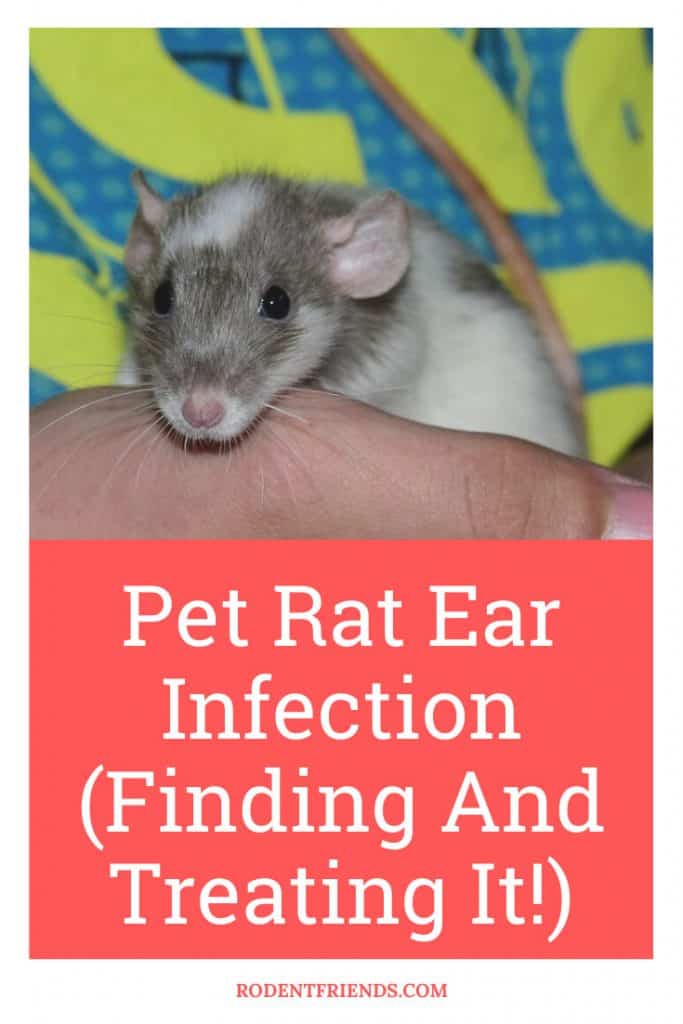Ear infections can be quite common in pet rats. Even though they can be hard to treat, they’re treatable! The important thing is to catch it early on. This way the infection doesn’t spread and your pet rat’s immune system doesn’t get worse
Most of the times your pet rat will be very lethargic and low on energy when sick. A common symptom for ear infection in pet rats is the loss of balance and tilting the head to one of the sides! If your pet rat is shying away from contact and hiding that can be a clear sign that they’re sick.
These are the most common symptoms, but we want to be even more specific for catching up on an ear infection. In this article, we’re gonna go over the most common symptoms as well as the right course of action to treat a pet rat ear infection!
Spotting An Ear Infection On Your Pet Rat
When they’re sick, pet rats will show signs of it. Most of the time, they stop being as active, hiding away so you don’t notice their weakness. They’ll also eat less or stop eating altogether.
They’ll also try and avoid contact with you. Remember that pet rats are prey animals, this means that they’ll try to hide their weaknesses so they’re not attacked. If they already know you and feel safe around you, it’s easier to know when they’re sick, because they’ll let you know!
But usually, expect them to get away from you or curl up in a ball when you reach for them. They’re trying to hide their sickness or wound. If your pet rat is very active and outgoing then this is a definitive sign that there’s something wrong with them.
There are a few ways to spot a pet rat ear infection! If you notice this kind of lethargy in one or more of your rodent friends, then the safest way is going to the veterinarian.
Of course, you can always check the internet or friends to understand what the problem is, but ultimately, you’ll have to bring your little furball to the veterinarian. This way they can safely tell you what’s wrong and what’s the best course of action!

But if you want to find out if your pet rat might have an ear infection just so you’re prepared before calling or going to the veterinary, here are some more specific signs and symptoms:
- Is your pet rat constantly scratching their ear? Most animals when having some kind of wound or pain will touch it continually. This often makes matters worse! If your pet rat is having an infection or any problem on their ears, chances are they’ll be scratching them constantly. If you notice this, bring them to a veterinarian as soon as possible. By constantly scratching, besides the infection, your pet rat might accidentally create wounds inside and around the ears, making matters even more complicated!
- Can you see liquid or pus dripping down of their ear? I don’t know if you’ve ever had an ear infection, I have to say that at this point, I’m a pro at them! Just like with us, pet rats can have liquid or pus dripping down their ears. This typically happens when the infection is in a more advanced state. This liquid usually has a yellow color and smells bad. If you suspect your rodent friend has an ear infection, try to look their ears (without touching much) and around. Their bedding might also appear dirty with this liquid, so you can check that as well!
- Is your pet rat out of balance and tilting their head to one side? This is probably one of the most noticeable symptoms. Ears are very important for balancing. It’s the same with us, even though we won’t lose balance if we have an ear infection (unless it’s really advanced). The same goes for pet rats. Not only that but again, the pain or itching will make them move more towards that side in the attempt of getting rid of it. If you notice this, bring your pet rat to the veterinary as soon as possible!
- Does your pet rat look very lethargic and out of energy? As mentioned above, this is the number one sign to notice when your pet rat is sick. Pet rats tend to be very active, so if you notice them not moving around, not even being interested in food, that’s a sign that there’s something wrong. If you notice that in any of your pet rats, again, calling or going to the veterinary is the next step.
When going to a veterinarian, they’ll know what to do and give you the treatment needed! An ear infection is easily treated, so as long as it’s properly followed through, your rodent friend will be nice and healthy in a few days!
Treating A Pet Rat Ear Infection
When getting to the veterinary, they’ll examine your pet rat and ask you some questions. Such as, what symptoms do they have and when did they start showing those symptoms. These are the routine questions so they have an idea of what’s going on.
After that, your pet rat will be examined. With ear infections, they probably won’t need tests or any kind of exam. The veterinary will mostly check their ears as well as their weight and even some other parts of the body. This way they can be sure the origin of the infection.
Now it’s time to hear about the treatment. Your veterinarian will most likely prescribe some antibiotics along with anti-inflammatory and maybe even some vitamins to boost their immune system.
Sometimes the medication comes in liquid form, so you only need to use a syringe and feed them. Others, it’s via pills, which can be harder to administrate. But you can always crush the pills into dust and mix it in a bit of pate or fruit pureé.
This all depends on where you live. Since pet rats are exotic pets and tend to be a rarer animal to own, there aren’t as many developed medicines made specifically for them. This means veterinaries need to adapt.
So if you live in a country where it’s more often to own pet rats, having proper and easier to administrate medicine won’t be a problem!
Both the antibiotic and anti-inflammatory are administrated orally. However your veterinary might also prescribe some ear drops to help fight the infection. This way it will also reduce your pet rat discomfort.
These are a bit more difficult to administrate but necessary. Your pet rat won’t like it but it’s for their own good.
With the proper medication, your pet rat will be good as new in no time!
Home Remedies For Pet Rat Ear Infections
I don’t recommend trying any home remedies for your pet rat. Even if you want to try something, it should go through a veterinarian first. It’s better to have a treatment that is approved by them, than messing up.
Remember that pet rats are very fragile creatures and giving them the wrong treatment can go terribly wrong. Always choose the safest option and contact a veterinarian once you notice something is wrong with your rodent friend!
However, instead of home remedies, you can help prevent and infection or keep your pet rat comfortable while recovering:
- Clean your pet rat’s cage every week: having a clean environment is very important to keep your pet rats healthy. Their urine and droppings release fowl bacteria that can be dangerous for them if not cleaned frequently. I always recommend doing a daily cleanup of their litter and then a deep cleaning once a week. A clean cage is also very important for your pet rats because they don’t like living in a dirty home and it’s stressful for them. If they get stressed, they are more prone to sickness!
- Give them nutritional food: this one is very important to keep your pet rats healthy! Always ensure that their food is nutritions and proper for them. There are lots of rations for rodents and it’s important to buy one that is made specifically for pet rats. Otherwise, they might not have the necessary nutrients for them. Other than that, I always recommend a food that is made out entirely of pellets, like the Oxbow Essentials (link to Amazon). This way your pet rat can’t be picky and eat only the ingredients they like the most.
- Keep your pet rat’s cage in a warm room: around 25º Celsius (77 Fahrenheit) is the ideal temperature to keep your pet rat’s comfortable. Our rodent friends don’t deal too well with both too warm temperatures or too cold. So a nice, amene temperature is the perfect way to go! Also, be careful to not leave the cage near a window that gets direct sunlight. This will also be very bad for them and pet rats don’t like bright lights either.
- Have the pet rat’s cage in a quiet place: just like they don’t like bright light, pet rats get very uncomfortable with loud noises. This goes both for when your pet rat has an ear infection but also to prevent it! With an ear infection it can be hurtful to have many loud noises around your pet rat, so keep their cage in a quiet and serene room. And even if they’re healthy, loud noises are very stressful for our rodent friends and might hurt their ears as well.
- Pay attention to possible symptoms: remember all those symptoms we’ve talked about so you can catch infections early on! This will make it much easier to treat and you can tell if your pet rat is getting worse or better. In general, if you notice your pet rat low on energy and have completely different behavior from their usual, bring them to a veterinarian or call one!
- Call your vet if the ear infection gets worse: this is pretty self-explanatory, but if you can keep your veterinarian updated with how the treatment is going, they will be able to help you better. For some reason, the treatment isn’t working, or you’re just having difficulty into giving your pet rat their medication. If you have any problem don’t hesitate in contacting your veterinarian. They’re here to help!
Back to the Blog






